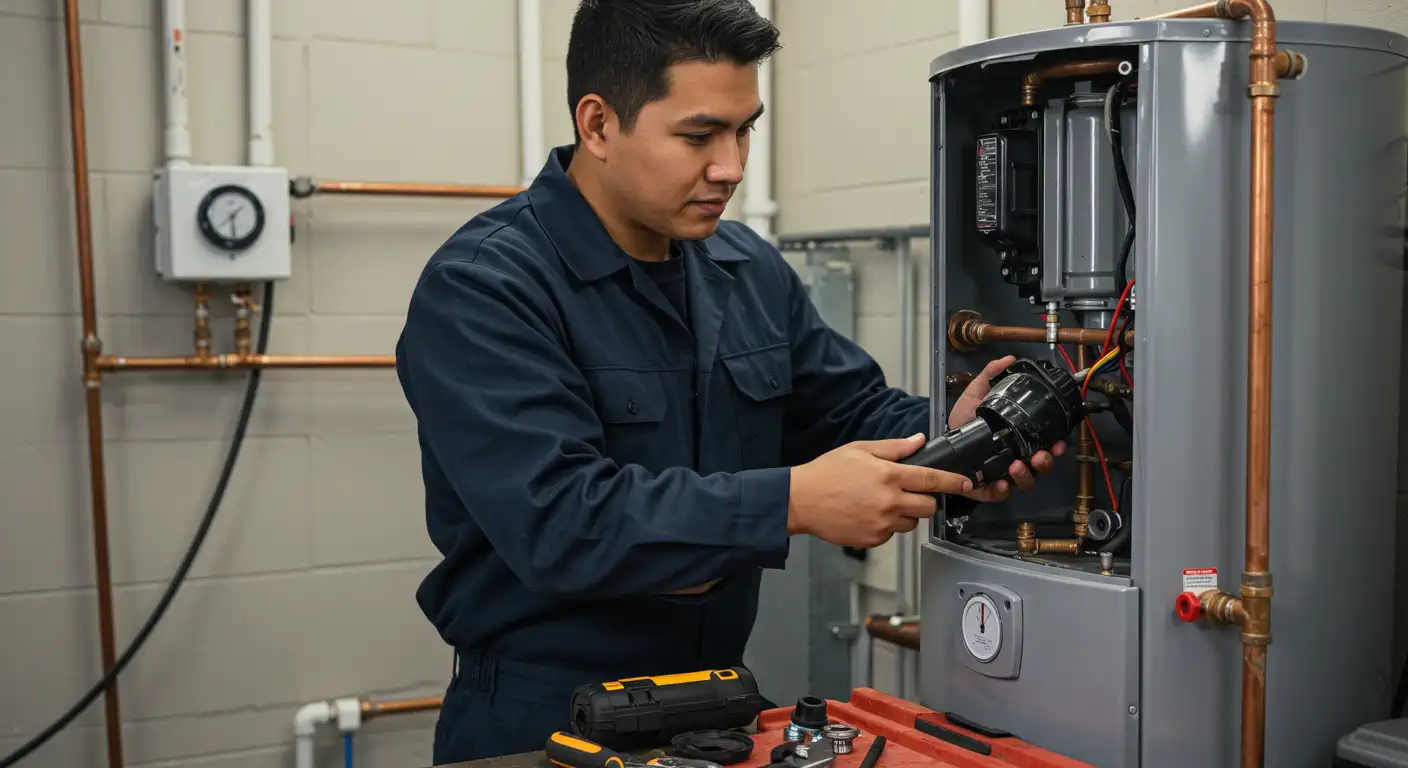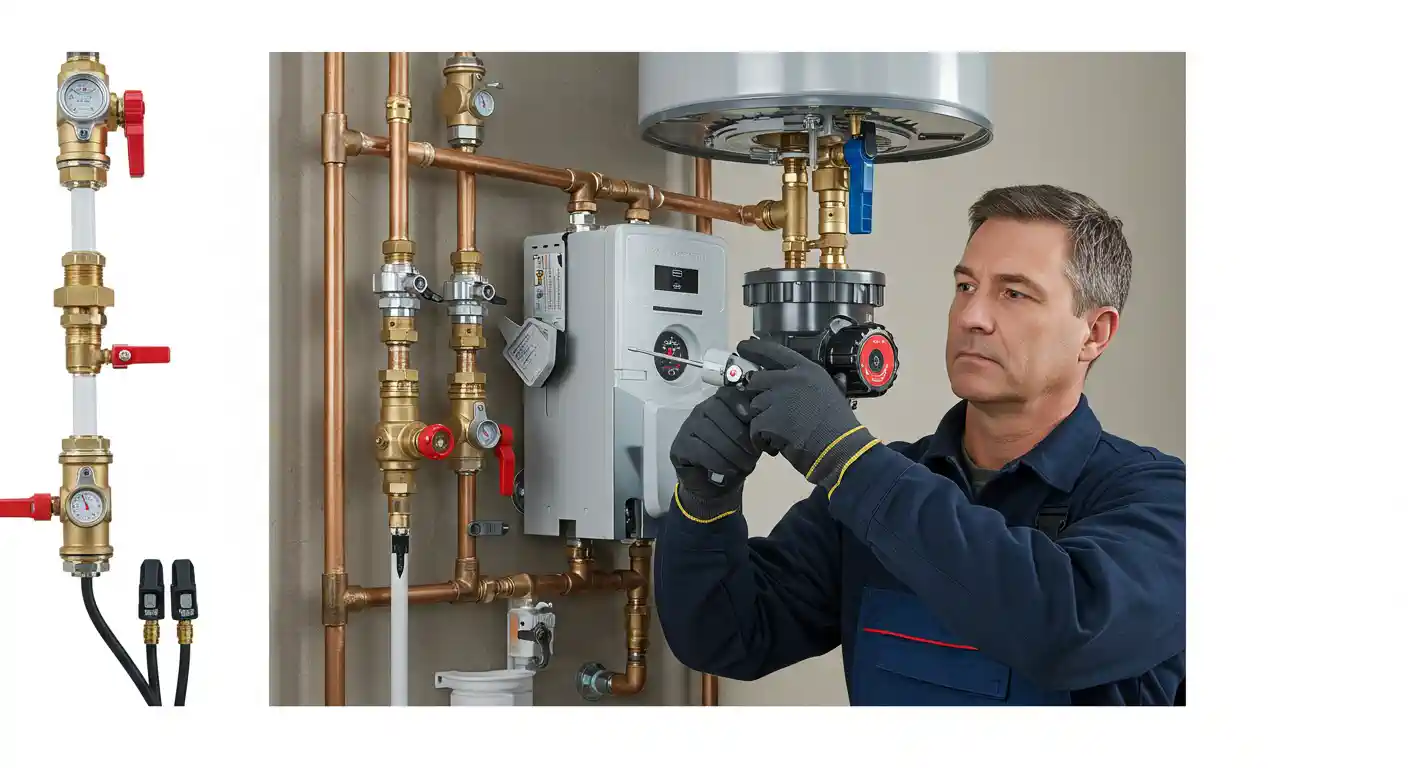Tankless Water Heater Installation and Repair in Ballston, VA
For homeowners in Ballston, ensuring a reliable and efficient source of hot water is essential for daily comfort and convenience. Traditional tank water heaters, while common, often have limitations like running out of hot water during peak usage or consuming energy to heat water they store constantly. Tankless water heaters offer a modern alternative, providing hot water on demand and potentially improving energy efficiency in your home. Understanding how these systems work and their benefits can help you determine if a tankless unit is the right fit for your Ballston residence.
Unlike conventional storage tank water heaters, which keep a large quantity of water heated at all times, tankless systems heat water only when it's needed. When you turn on a hot water faucet or an appliance requiring hot water, cold water travels through a pipe into the tankless unit. Inside, a powerful heating element (either gas or electric) quickly warms the water to your desired temperature. This hot water is then delivered directly to the fixture. When the demand for hot water stops, the heating element shuts off. This on-demand process is the fundamental difference and the source of the key advantages offered by tankless units.

The Advantages of Tankless Water Heaters for Ballston Homes
Switching to a tankless water heater can provide several significant benefits for Ballston homeowners:
- Endless Hot Water: One of the most appealing advantages is the continuous supply of hot water. Since water is heated as it flows through the unit, you won't run out, even if multiple people are showering or using hot water simultaneously. This is particularly beneficial for larger families or homes with high hot water demand.
- Increased Energy Efficiency: Tankless water heaters are generally more energy-efficient than traditional tank units. Because they don't need to maintain a large tank of water at a set temperature 24/7, they avoid standby energy losses. According to the U.S. Department of Energy, tankless water heaters can be 24% to 34% more energy efficient for homes that use 41 gallons or less of hot water daily. Even homes with higher hot water needs can see efficiency gains of 8% to 14%. This increased efficiency can translate into noticeable savings on your energy bills over time.
- Space Saving: Tankless units are significantly smaller than bulky storage tanks. They can be mounted on a wall, often in more convenient locations, freeing up valuable space in basements, garages, or utility closets. This compact design offers greater installation flexibility.
- Longer Lifespan: Tankless water heaters typically have a longer lifespan than traditional tank heaters, often lasting 20 years or more with proper maintenance. This is roughly double the average lifespan of a conventional tank unit, providing a better long-term investment.
- Reduced Risk of Leaks: Without a large tank storing water, the risk of a catastrophic leak flooding your basement or garage is substantially reduced compared to aging tank units.
- Cleaner Water: Water in a tankless system doesn't sit in a storage tank where sediment can build up over time. The water delivered is heated fresh as it passes through the unit, which some homeowners prefer.

Understanding Tankless Water Heater Types: Gas vs. Electric
Tankless water heaters come in two main types: natural gas (or propane) and electric. The best choice for your Ballston home depends on various factors:
- Gas Tankless Water Heaters: These are often favored for their high heating capacity, capable of providing hot water for multiple fixtures simultaneously, making them suitable for larger homes or those with high peak demand. They require access to a natural gas line or propane supply and proper venting for combustion gases. Installation can be more complex and costly if gas lines or venting need to be installed or upgraded.
- Electric Tankless Water Heaters: Electric units are typically smaller and easier to install as they don't require gas lines or venting. They are a good option where gas is unavailable or for point-of-use applications (heating water for a single faucet or shower). However, electric tankless heaters often require significant electrical capacity, potentially necessitating an electrical panel upgrade, and their heating capacity (measured in GPM) is generally lower than gas units, which might limit simultaneous hot water use in larger homes.
Choosing between gas and electric requires evaluating your home's existing infrastructure, hot water needs, and budget. A professional assessment can help determine the most suitable type and size for your specific situation.
Sizing Your Tankless Water Heater for Ballston
Proper sizing is crucial for optimal performance of a tankless water heater. Sizing is primarily determined by the required flow rate, measured in Gallons Per Minute (GPM), and the temperature rise needed.
- GPM Requirement: This is calculated based on how many hot water fixtures you anticipate using simultaneously and the GPM each fixture demands. For example, a shower might use 2.5 GPM, a faucet 1 GPM, and a washing machine 2 GPM. If you plan to run a shower and the washing machine at the same time, you would need a unit capable of providing at least 4.5 GPM. Using multiple showers simultaneously requires a higher GPM capacity.
- Temperature Rise: Tankless units need to heat incoming cold water to the desired hot water temperature. The required temperature rise depends on the temperature of the incoming cold water (which varies seasonally in Ballston) and your desired hot water temperature. Units have a maximum GPM they can provide at a certain temperature rise.
Undersizing a tankless unit can lead to insufficient hot water flow when multiple fixtures are used, while oversizing can result in unnecessary initial cost. An experienced plumber will assess your home's hot water needs, the number and type of fixtures, and local water temperatures to recommend the correctly sized unit.
Professional Tankless Water Heater Installation in Ballston, VA
Installing a tankless water heater is a complex process that requires specialized plumbing, and potentially electrical and gas work. It is not a DIY project and should always be handled by licensed and certified professionals.
The Tankless Water Heater Installation process typically involves:
- Removing your old water heater (if applicable).
- Running new or modifying existing water lines to connect to the tankless unit.
- Installing or connecting to a gas line (for gas units) or dedicated electrical circuit (for electric units) with appropriate capacity.
- Installing venting (for gas units) according to manufacturer specifications and local building codes.
- Mounting the unit securely and connecting all lines.
- Testing the system to ensure proper operation, temperature output, and leak-free connections.
- Ensuring all work meets Ballston and Northern Virginia plumbing and building codes, including handling necessary permits.
Choosing a professional team for your installation ensures safety, compliance, and optimal performance of your new system. Experienced installers can anticipate and handle challenges specific to existing homes, such as necessary plumbing modifications or electrical panel upgrades, ensuring a smooth transition.
Tankless Water Heater Repair and Maintenance in Ballston
Like any appliance, tankless water heaters may occasionally require Water Heater Repair. Common issues can include igniter problems (gas units), mineral buildup in heat exchangers (especially in areas with hard water), or electronic component failures.
Routine maintenance is essential to keep your tankless water heater operating efficiently and to extend its lifespan. This typically involves flushing the system annually to remove mineral deposits that can clog the heat exchanger and reduce efficiency. Other maintenance checks may include inspecting the air intake, exhaust venting, and electrical or gas connections.
Regular Water Heater Repair and maintenance services from a trusted local plumbing provider can prevent minor issues from becoming major problems, ensure the unit is running at peak efficiency, and help you enjoy the full benefits of your tankless system for years to come.
The Investment: Tankless Water Heater Cost
It's important to understand that the initial cost of purchasing and installing a tankless water heater is typically higher than that of a traditional storage tank unit. The cost varies depending on the type of unit (gas often costs more than electric), the required size (GPM capacity), the complexity of the installation (e.g., needing new gas lines, venting, or electrical work), and the labor rates in the Ballston area.
However, the higher upfront investment is often offset over time by the long-term savings on energy bills due to increased efficiency and the longer lifespan of the unit. When considering the total cost of ownership over 20 years, a tankless heater can be a more economical choice. Additionally, exploring Financing options can make the initial cost more manageable for homeowners.
Choosing a Plumbing Partner in Ballston, VA
When considering a tankless water heater for your home in Ballston, partnering with a knowledgeable and reliable local plumbing company is key. Look for professionals who are familiar with the specific needs and regulations of the Northern Virginia area.
A trustworthy plumbing provider should prioritize delivering reliable service and demonstrating expertise in Water Heaters, including modern tankless technology. Their team should consist of Licensed and Certified experts who are committed to proactive and professional service, ensuring every job is completed to the highest standards. Choosing a Family-Owned Business often means working with a team that values trustworthiness and is deeply invested in the local community, striving to exceed expectations and provide satisfactory service on every call.
For all your Plumbing needs, including exploring tankless water heater options, professional installation, repair, and maintenance in Ballston, VA, working with experts dedicated to quality and customer care provides confidence and peace of mind.
Frequently Asked Questions About Tankless Water Heaters
What are the downsides to a tankless water heater?
The primary downsides include a higher initial purchase and installation cost compared to traditional tank heaters, and the potential for a slight delay in hot water arriving at the tap furthest from the unit. Gas units require venting, and electric units may require significant electrical upgrades.
Can I replace my traditional water heater with a tankless unit?
Yes, in most cases, a traditional tank heater can be replaced with a tankless unit. However, the installation requires significant modifications to plumbing, gas lines (if applicable), electrical wiring, and potentially venting, which is why professional installation is necessary.
Do I need a plumber to install a tankless water heater?
Absolutely. Due to the complex plumbing, gas, electrical, and venting requirements, and the need to comply with local building codes and obtain permits, professional installation by a licensed and certified plumber is essential for safety, efficiency, and warranty validation.
How long does tankless water heater installation take?
The duration varies depending on the complexity of the job, such as whether new gas lines or significant electrical work are needed. A standard replacement might take several hours, while a more complex installation could take a full day or more.
How do I size a tankless water heater for my home?
Sizing is based on the required GPM (Gallons Per Minute) flow rate needed for simultaneous hot water use and the necessary temperature rise. A professional plumber will help you calculate your home's specific GPM needs based on the number and type of fixtures and your typical usage patterns.
What is the lifespan of a tankless water heater?
With proper installation and regular maintenance, tankless water heaters typically last 20 years or more, significantly longer than the average 10-12 year lifespan of a traditional tank water heater.
Do tankless water heaters require maintenance?
Yes, regular maintenance is crucial. Annual flushing to remove mineral buildup is highly recommended to ensure the unit's efficiency, performance, and longevity, especially in areas with hard water.
Trusted Brands.
We partner with industry-leading manufacturers to ensure your plumbing system runs on durable, high-quality parts built to last.


















Customer Testimonials
Cherry Blossom Plumbing has consistently provided top-notch service, ensuring every issue is resolved efficiently and professionally.

Service Areas
Proudly serving Arlington and the surrounding Virginia communities with fast, reliable plumbing solutions you can count on.




